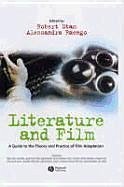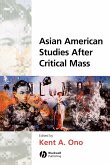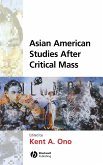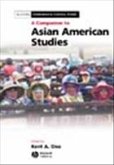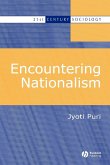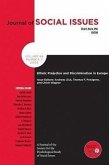STAM R ROBERT / RAENGO ALESSANDRAA Guide to the Theory and Practice of Film Adaptation
Literature and Film
A Guide to the Theory and Practice of Film Adaptation
Herausgeber: Stam, Robert; Raengo, Alessandra
STAM R ROBERT / RAENGO ALESSANDRAA Guide to the Theory and Practice of Film Adaptation
Literature and Film
A Guide to the Theory and Practice of Film Adaptation
Herausgeber: Stam, Robert; Raengo, Alessandra
- Gebundenes Buch
- Merkliste
- Auf die Merkliste
- Bewerten Bewerten
- Teilen
- Produkt teilen
- Produkterinnerung
- Produkterinnerung
"Literature and Film" is a cornucopia of vibrant essays that chart the history and confluence of literature and film. It explores in detail a wide and international spectrum of novels and adaptations, bringing together the very latest scholarship in the field.
Andere Kunden interessierten sich auch für
![Asian American Studies After Critical Mass Asian American Studies After Critical Mass]() KENT A. ONOAsian American Studies After Critical Mass70,99 €
KENT A. ONOAsian American Studies After Critical Mass70,99 €![Asian American Studies After Critical Mass Asian American Studies After Critical Mass]() KENT A. ONOAsian American Studies After Critical Mass155,99 €
KENT A. ONOAsian American Studies After Critical Mass155,99 €![A Companion to Asian American Studies A Companion to Asian American Studies]() ONO KA KENT A.A Companion to Asian American Studies188,99 €
ONO KA KENT A.A Companion to Asian American Studies188,99 €![Encountering Nationalism Encountering Nationalism]() Jyoti PuriEncountering Nationalism55,99 €
Jyoti PuriEncountering Nationalism55,99 €![Questions of Method in Cultural Studies Questions of Method in Cultural Studies]() SCHWOCH JAMESGAONKAR DILIPWHITE MIMIQuestions of Method in Cultural Studies139,99 €
SCHWOCH JAMESGAONKAR DILIPWHITE MIMIQuestions of Method in Cultural Studies139,99 €![Methods in Cultural Studies Methods in Cultural Studies]() SCHWOCH JAMESGAONKAR DILIPWHITE MIMIMethods in Cultural Studies48,99 €
SCHWOCH JAMESGAONKAR DILIPWHITE MIMIMethods in Cultural Studies48,99 €![Ethnic Prejudice and Discrimination in Europe Ethnic Prejudice and Discrimination in Europe]() Ethnic Prejudice and Discrimination in Europe35,99 €
Ethnic Prejudice and Discrimination in Europe35,99 €-
-
-
"Literature and Film" is a cornucopia of vibrant essays that chart the history and confluence of literature and film. It explores in detail a wide and international spectrum of novels and adaptations, bringing together the very latest scholarship in the field.
Hinweis: Dieser Artikel kann nur an eine deutsche Lieferadresse ausgeliefert werden.
Hinweis: Dieser Artikel kann nur an eine deutsche Lieferadresse ausgeliefert werden.
Produktdetails
- Produktdetails
- Verlag: Wiley
- Seitenzahl: 376
- Erscheinungstermin: 15. Oktober 2004
- Englisch
- Abmessung: 240mm x 184mm x 25mm
- Gewicht: 794g
- ISBN-13: 9780631230540
- ISBN-10: 0631230548
- Artikelnr.: 22146748
- Herstellerkennzeichnung
- Libri GmbH
- Europaallee 1
- 36244 Bad Hersfeld
- gpsr@libri.de
- Verlag: Wiley
- Seitenzahl: 376
- Erscheinungstermin: 15. Oktober 2004
- Englisch
- Abmessung: 240mm x 184mm x 25mm
- Gewicht: 794g
- ISBN-13: 9780631230540
- ISBN-10: 0631230548
- Artikelnr.: 22146748
- Herstellerkennzeichnung
- Libri GmbH
- Europaallee 1
- 36244 Bad Hersfeld
- gpsr@libri.de
Robert Stam is University Professor at New York University. His many books include Film Theory: An Introduction (Blackwell, 2000), Unthinking Eurocentrism: Multiculturalism and the Media (with Ella Shohat, 1994), and Subversive Pleasures: Bakhtin, Cultural Criticism and Film (1989). With Toby Miller, he is the editor of Film and Theory (Blackwell, 2000) and The Blackwell Companion to Film Theory (2000). Alessandra Raengo is finishing her PhD in the Cinema Studies Department at New York University. Her dissertation explores race and vernacular social criticism in American culture between 1945 and 1968. Among her publications are The Birth of Film Genres (1999) and The Bounds of Representation (2000), both multilingual volumes edited with Leonardo Quaresima and Laura Vichi.
List of Illustrations.
Notes on Contributors.
Preface.
Acknowledgments.
Introductory Essay: The Theory and Practice of Adaptation: Robert Stam.
1. Improvements and Reparations at Mansfield Park: Tim Watson (Princeton
University).
2. Keeping the Carcass in Motion: Adaptation and Transmutations of the
National in The Last of the Mohicans: Jacquelyn Kilpatrick (California
State University, Channel Islands).
3. The Discreet Charm of the Leisure Class: Terence Davies's The House of
Mirth: Richard Porton (Cineaste magazine).
4. In Search of Adaptation: Proust and Film: Melissa Anderson (CUNY
Graduate Center).
5. The Grapes of Wrath: Thematic Emphasis through Visual Style: Vivian C.
Sobchack (UCLA).
6. Cape Fear and Trembling: Familial Dread: Kirsten Thompson (Wayne State
University).
7. The Carnival of Repression: German Left Wing Politics and The Lost Honor
of Katarina Blum: Alexandra Seibel (New York University).
8. Serial Time: Bluebeard in Stepford: Bliss Cua Lim (University of
California, Irvine).
9. Boyz 'N the Hood Chronotope: Spike Lee, Richard Price, and the Changing
Authorship of Clockers: Paula J. Massood (Brooklyn College, CUNY).
10. Defusing The English Patient: Patrick Deer (New York University).
11. Carnivals and Goldfish: History and Crisis in The Butcher Boy: Jessica
Scarlata (New York University).
12. Mild Revisionism, Failed Revolts: Esquivel's and Arau's Like Water for
Chocolate, A Retrospective View: Dianna C. Niebylski (University of
Kentucky).
13. Beloved: The Adaptation of an American Slave Narrative: Mia Mask (New
York University).
14. Oral Traditions, Literature and Cinema in Africa: Mbye Cham (Howard
University).
15. Memory and History in the Politics of Adaptation: Revisiting the
Partition of India in Tamas: Ranjani Mazundar (Jamia Millia Islamia).
16. The Written Scene: Writers as Figures of Cinematic Redemption: Paul
Arthur (Montclair State University).
Index
Notes on Contributors.
Preface.
Acknowledgments.
Introductory Essay: The Theory and Practice of Adaptation: Robert Stam.
1. Improvements and Reparations at Mansfield Park: Tim Watson (Princeton
University).
2. Keeping the Carcass in Motion: Adaptation and Transmutations of the
National in The Last of the Mohicans: Jacquelyn Kilpatrick (California
State University, Channel Islands).
3. The Discreet Charm of the Leisure Class: Terence Davies's The House of
Mirth: Richard Porton (Cineaste magazine).
4. In Search of Adaptation: Proust and Film: Melissa Anderson (CUNY
Graduate Center).
5. The Grapes of Wrath: Thematic Emphasis through Visual Style: Vivian C.
Sobchack (UCLA).
6. Cape Fear and Trembling: Familial Dread: Kirsten Thompson (Wayne State
University).
7. The Carnival of Repression: German Left Wing Politics and The Lost Honor
of Katarina Blum: Alexandra Seibel (New York University).
8. Serial Time: Bluebeard in Stepford: Bliss Cua Lim (University of
California, Irvine).
9. Boyz 'N the Hood Chronotope: Spike Lee, Richard Price, and the Changing
Authorship of Clockers: Paula J. Massood (Brooklyn College, CUNY).
10. Defusing The English Patient: Patrick Deer (New York University).
11. Carnivals and Goldfish: History and Crisis in The Butcher Boy: Jessica
Scarlata (New York University).
12. Mild Revisionism, Failed Revolts: Esquivel's and Arau's Like Water for
Chocolate, A Retrospective View: Dianna C. Niebylski (University of
Kentucky).
13. Beloved: The Adaptation of an American Slave Narrative: Mia Mask (New
York University).
14. Oral Traditions, Literature and Cinema in Africa: Mbye Cham (Howard
University).
15. Memory and History in the Politics of Adaptation: Revisiting the
Partition of India in Tamas: Ranjani Mazundar (Jamia Millia Islamia).
16. The Written Scene: Writers as Figures of Cinematic Redemption: Paul
Arthur (Montclair State University).
Index
List of Illustrations.
Notes on Contributors.
Preface.
Acknowledgments.
Introductory Essay: The Theory and Practice of Adaptation: Robert Stam.
1. Improvements and Reparations at Mansfield Park: Tim Watson (Princeton
University).
2. Keeping the Carcass in Motion: Adaptation and Transmutations of the
National in The Last of the Mohicans: Jacquelyn Kilpatrick (California
State University, Channel Islands).
3. The Discreet Charm of the Leisure Class: Terence Davies's The House of
Mirth: Richard Porton (Cineaste magazine).
4. In Search of Adaptation: Proust and Film: Melissa Anderson (CUNY
Graduate Center).
5. The Grapes of Wrath: Thematic Emphasis through Visual Style: Vivian C.
Sobchack (UCLA).
6. Cape Fear and Trembling: Familial Dread: Kirsten Thompson (Wayne State
University).
7. The Carnival of Repression: German Left Wing Politics and The Lost Honor
of Katarina Blum: Alexandra Seibel (New York University).
8. Serial Time: Bluebeard in Stepford: Bliss Cua Lim (University of
California, Irvine).
9. Boyz 'N the Hood Chronotope: Spike Lee, Richard Price, and the Changing
Authorship of Clockers: Paula J. Massood (Brooklyn College, CUNY).
10. Defusing The English Patient: Patrick Deer (New York University).
11. Carnivals and Goldfish: History and Crisis in The Butcher Boy: Jessica
Scarlata (New York University).
12. Mild Revisionism, Failed Revolts: Esquivel's and Arau's Like Water for
Chocolate, A Retrospective View: Dianna C. Niebylski (University of
Kentucky).
13. Beloved: The Adaptation of an American Slave Narrative: Mia Mask (New
York University).
14. Oral Traditions, Literature and Cinema in Africa: Mbye Cham (Howard
University).
15. Memory and History in the Politics of Adaptation: Revisiting the
Partition of India in Tamas: Ranjani Mazundar (Jamia Millia Islamia).
16. The Written Scene: Writers as Figures of Cinematic Redemption: Paul
Arthur (Montclair State University).
Index
Notes on Contributors.
Preface.
Acknowledgments.
Introductory Essay: The Theory and Practice of Adaptation: Robert Stam.
1. Improvements and Reparations at Mansfield Park: Tim Watson (Princeton
University).
2. Keeping the Carcass in Motion: Adaptation and Transmutations of the
National in The Last of the Mohicans: Jacquelyn Kilpatrick (California
State University, Channel Islands).
3. The Discreet Charm of the Leisure Class: Terence Davies's The House of
Mirth: Richard Porton (Cineaste magazine).
4. In Search of Adaptation: Proust and Film: Melissa Anderson (CUNY
Graduate Center).
5. The Grapes of Wrath: Thematic Emphasis through Visual Style: Vivian C.
Sobchack (UCLA).
6. Cape Fear and Trembling: Familial Dread: Kirsten Thompson (Wayne State
University).
7. The Carnival of Repression: German Left Wing Politics and The Lost Honor
of Katarina Blum: Alexandra Seibel (New York University).
8. Serial Time: Bluebeard in Stepford: Bliss Cua Lim (University of
California, Irvine).
9. Boyz 'N the Hood Chronotope: Spike Lee, Richard Price, and the Changing
Authorship of Clockers: Paula J. Massood (Brooklyn College, CUNY).
10. Defusing The English Patient: Patrick Deer (New York University).
11. Carnivals and Goldfish: History and Crisis in The Butcher Boy: Jessica
Scarlata (New York University).
12. Mild Revisionism, Failed Revolts: Esquivel's and Arau's Like Water for
Chocolate, A Retrospective View: Dianna C. Niebylski (University of
Kentucky).
13. Beloved: The Adaptation of an American Slave Narrative: Mia Mask (New
York University).
14. Oral Traditions, Literature and Cinema in Africa: Mbye Cham (Howard
University).
15. Memory and History in the Politics of Adaptation: Revisiting the
Partition of India in Tamas: Ranjani Mazundar (Jamia Millia Islamia).
16. The Written Scene: Writers as Figures of Cinematic Redemption: Paul
Arthur (Montclair State University).
Index

